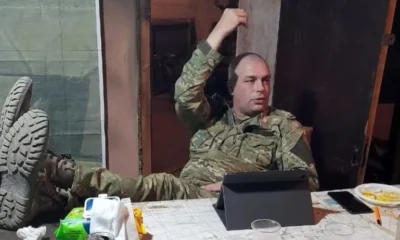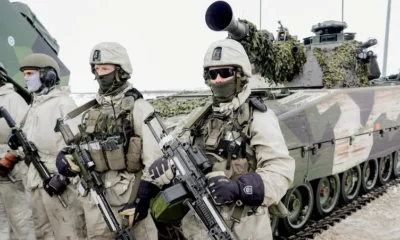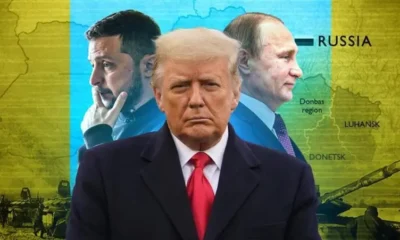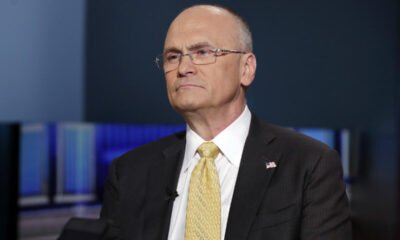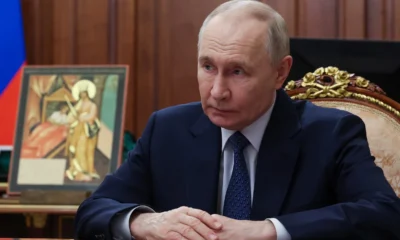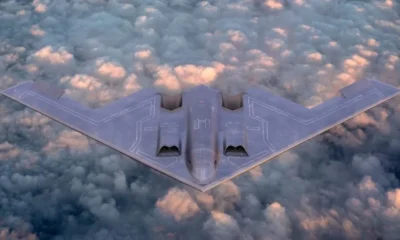NATO SUMMIT
NATO Summit Under Cloud of Biden’s Uncertain Future
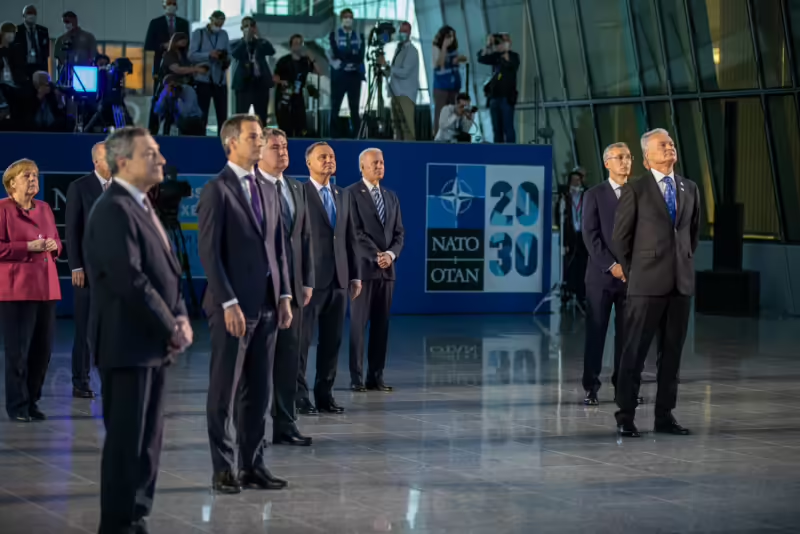
As NATO Gathers, Allies Quietly Worry About Biden’s Political Stability
The White House is set to host a significant NATO summit this week, bringing together members of the newly enlarged alliance to strategize Ukraine’s defense. However, the event is overshadowed by growing concerns over President Joe Biden’s political future, following his faltering debate performance against Republican challenger Donald Trump.
Despite mounting calls for him to step aside, the 81-year-old Biden reaffirmed his commitment to the presidential race. “All the data shows that the average Democrat out there voted, 14 million of them who voted for me, still want me to be the nominee,” Biden said during a phone call with MSNBC’s “Morning Joe” program.
White House officials have dismissed concerns that Biden’s uncertain future could destabilize NATO. John Kirby, the White House national security spokesperson, emphasized that allies are enthusiastic about the summit and the collaborative efforts to support Ukraine. “We’re not picking up any signs of that from our allies at all, quite the contrary,” Kirby stated. “The conversations that we’re having with them in advance are that they’re excited about this summit. They’re excited about the possibilities and the things we’re going to be doing together specifically to help Ukraine.”
However, analysts suggest that NATO leaders, while publicly supportive, are privately uneasy. Richard Stoll, a political scientist at Rice University, noted that NATO countries are cautious about appearing to interfere in U.S. politics. “Leaders of the NATO countries may not love Joe Biden, but if we look back to the Trump administration, he [Trump] said a number of things that were really anti-NATO. And I think, with all honesty, that most NATO countries would prefer Biden – again, not necessarily because they’re so pro-Biden, but because of the things that Trump has said and threatened to do about NATO,” Stoll explained. “But they don’t want to necessarily say a lot about this publicly because it looks like they’re interfering in American elections, which is not something they’re supposed to do.”
The summit also faces internal divisions. Hungary’s far-right Prime Minister Viktor Orban recently visited Russian President Vladimir Putin, positioning himself as a mediator between the adversaries. Orban’s stance complicates the alliance’s unified front. “In the last two and a half years, there are fewer and fewer, and now remain hardly any, who are able to speak with both warring parties,” Orban said in Moscow. “Hungary is one of very few.”
Despite these tensions, a breakthrough in the Russia-Ukraine conflict seems unlikely during the summit. Putin insists that Ukraine is not “ready” to discuss terms, which he asserts include the retreat of Ukrainian troops from the four regions Russia claims to have annexed. Meanwhile, Ukraine seeks a “just peace” that encompasses all its territory. Ukraine’s leader is expected to attend the summit to advocate for this position and push for future NATO membership.
As NATO representatives convene on Tuesday in Washington, the backdrop of Biden’s political uncertainty adds a complex layer to an already critical meeting. The alliance must navigate internal and external challenges while maintaining a robust defense strategy for Ukraine. The outcome of this summit could significantly impact the geopolitical landscape and the future stability of NATO.

Editor's Pick
NATO Command to Revolutionize Ukraine Aid, Operational by September
Stoltenberg Unveils Bold New Strategy Amidst Intensifying Conflict
In a dramatic turn of events, NATO Secretary-General Jens Stoltenberg revealed that a new command center focused on coordinating military aid and training for Ukraine will be operational by September. This strategic hub, based in Germany and led by a three-star general with a team of 700 personnel, promises to revolutionize how aid is delivered to Ukraine, making the assistance more efficient and predictable amid the relentless Russian onslaught.
The decision, made during a high-stakes NATO summit, underscores the alliance’s unwavering commitment to Ukraine. This new command center could be a game-changer, centralizing efforts and ensuring that military support reaches the Ukrainian front lines more effectively. As Stoltenberg made this groundbreaking announcement, he stood on the brink of a crucial meeting involving 50 European leaders in Britain, where Ukrainian President Volodymyr Zelenskyy was also present, hinting at new security agreements in the pipeline.
Ukraine, embroiled in a fierce battle for its survival, continues to fend off Russian attacks. Just recently, the Ukrainian military intercepted 16 Russian aerial drones and two guided missiles targeting key regions like Dnipropetrovsk, Kharkiv, Kyiv, Poltava, and Zaporizhzhia. Despite the constant threat, Ukrainian air defenses remain resilient, shooting down drones before they could wreak havoc. The regional governor of Dnipropetrovsk reported injuries and damage from these relentless attacks, highlighting the civilian toll of this brutal conflict.
Russia, on the other hand, claimed to have destroyed 33 Ukrainian aerial drones and 10 naval drones, allegedly heading toward the Russia-occupied Crimean Peninsula. With aerial drones shot down over Crimea and Bryansk, Russia’s defense ministry’s narrative paints a picture of an ongoing, fierce aerial battle with high stakes on both sides.
As the war rages on, Ukrainian Defense Minister Rustem Umerov dropped a bombshell at the Aspen Security Forum, revealing that a staggering 500,000 Russian troops are currently surrounding Ukraine, with plans to bolster this force by an additional 200,000 to 300,000 troops. Umerov’s chilling statistics of 550,000 Russians killed or wounded in the two-year conflict underscore the scale of the human cost. He also pointed out Russia’s increasing reliance on mercenaries, including those from Africa, to sustain its military campaign.
In a controversial push, Ukraine is lobbying to lift restrictions on the use of long-range weapons against deep Russian targets. Umerov articulated a shift from focusing on weapon range to their functionality, indicating a strategic pivot that could reshape the battlefield dynamics. This bold stance reveals Ukraine’s desperation and determination to strike back more effectively against Russian aggression.
Amidst the chaos, a glimmer of humanity shone through as Russia and Ukraine conducted their 54th prisoner swap since the invasion began. This latest exchange saw 95 prisoners from each side returning home, facilitated by the United Arab Emirates. Ukrainian President Zelenskyy’s gratitude towards the UAE for their role in these exchanges highlights the complex web of international diplomacy at play.
The imminent activation of NATO’s new command center in Germany marks a pivotal moment in the ongoing conflict. This command could drastically enhance the coordination of military aid to Ukraine, potentially tipping the scales in favor of the beleaguered nation. The global implications of this move are profound, signaling a more robust and unified NATO response to Russian aggression.
The Ukrainian military’s resilience and NATO’s renewed commitment paint a picture of defiance against overwhelming odds. Yet, the human cost remains staggering, with both military and civilian lives continually at risk. As the conflict grinds on, the world watches, captivated by the unfolding drama and the high-stakes maneuvers that could determine the future of Ukraine and the stability of the region.
In conclusion, NATO’s bold move to establish a new command center for Ukraine aid is a strategic masterstroke that promises to enhance military support and coordination. As the war with Russia intensifies, the stakes have never been higher, and the international community’s response will be crucial in shaping the outcome. The coming months will undoubtedly be critical, as NATO’s new command becomes operational and Ukraine continues its valiant fight for sovereignty and survival.
Military
More Patriots and F-16s for Ukraine, But Deep Strikes in Russia Remain Off-Limits
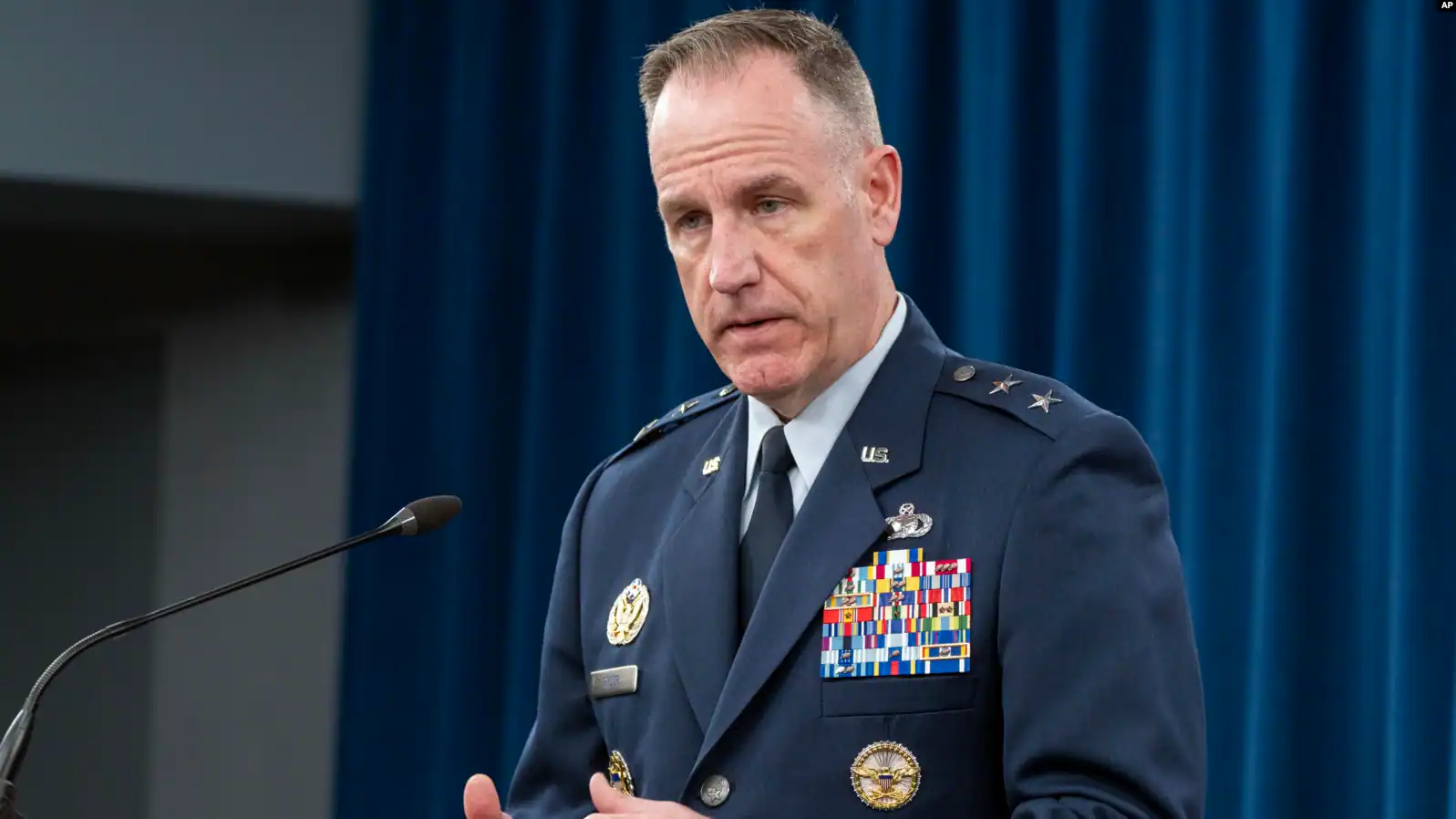
U.S. Enhances Ukraine’s Defense Capabilities Amid Escalating Conflict, Avoids Provoking Wider War with Long-Range Strikes
In a crucial pivot to bolster Ukraine’s defense, the United States has ramped up support with additional Patriot air defense systems and F-16 fighter jets. Yet, despite Ukrainian appeals for greater flexibility to strike deeper into Russian territory, the U.S. remains firm on its current policy, avoiding actions that could escalate the conflict into a broader war.
In a revealing interview with Voice of America, Pentagon Press Secretary Major General Pat Ryder elaborated on these critical decisions, shedding light on the intricacies of U.S. support for Ukraine amid the ongoing conflict with Russia.
President Biden recently announced the deployment of additional Patriot batteries to Ukraine, a move underscoring the high priority placed on enhancing Ukraine’s air defense. When pressed about the timeline for delivery, Ryder emphasized operational security but assured that efforts to expedite these systems are underway. The urgency is palpable, especially after recent Russian missile strikes, including a devastating attack on a children’s hospital in Kyiv.
Ryder acknowledged that the Patriot systems would require Ukrainian soldiers to undergo extensive training to ensure their effective deployment. “Air defense for Ukraine has been a priority for Secretary Austin and the U.S. government for a while now,” Ryder stated, highlighting the continuous efforts to equip Ukraine against relentless Russian missile assaults.
The arrival of F-16 fighter jets, another significant boost to Ukraine’s defense arsenal, comes with its own set of challenges. These high-tech aircraft will be prime targets for Russian forces. Ryder detailed how the U.S., alongside Denmark and the Netherlands, is leading efforts to train Ukrainian pilots and maintainers on the complex systems. This comprehensive training is crucial for ensuring the jets’ operational readiness and survivability in a hostile environment.
Despite these advancements, the U.S. maintains a cautious stance on Ukraine’s use of long-range weapons, particularly the ATACMS missiles. Ukrainian President Volodymyr Zelenskyy has repeatedly called for lifting restrictions on these weapons to strike deeper into Russian territory. However, Ryder reiterated that the U.S. policy remains unchanged, driven by concerns over potential escalation. “We don’t want to see unintended consequences and escalation to make this a broader conflict,” Ryder explained, emphasizing the delicate balance of providing robust support while avoiding actions that could widen the war.
The Pentagon’s strategy includes recent permissions allowing Ukraine to strike Russian targets just across the border, a move aimed at defending regions like Kharkiv from immediate threats. Yet, Ryder pointed out the importance of considering the broader implications of deeper strikes inside Russia. “You have to look at the second and third-order effects in terms of potential escalation,” he noted, underscoring the careful calculus behind U.S. military support.
In addition to enhancing Ukraine’s immediate defense capabilities, long-term support plans are also taking shape. NATO’s announcement of a new command center in Wiesbaden, Germany, is a significant step toward coordinated and sustained assistance for Ukraine. This three-star command center will focus on training and security assistance, aligning efforts with the Ukraine Defense Contact Group to ensure seamless support.
As Ukraine aspires to join NATO, this initiative will play a pivotal role in building interoperability and strengthening Ukraine’s military capabilities. “This will be complementary to and supportive of the Ukraine Defense Contact Group,” Ryder explained, highlighting the strategic importance of this command center in preparing Ukraine for future NATO membership.
The U.S. continues to walk a tightrope, providing substantial support to Ukraine while meticulously avoiding actions that could provoke a wider war. As the conflict evolves, the Pentagon remains steadfast in its commitment to helping Ukraine defend its sovereignty without crossing lines that could trigger dangerous escalations. This careful balancing act is crucial as the world watches the unfolding drama in Eastern Europe.
Military
Latvian Foreign Minister: Putin is Counting on Western Fatigue
In the shadow of a brutal missile attack on Ukraine, NATO leaders convened in Washington, reaffirming their support for Ukraine amid ongoing Russian aggression. Latvian Foreign Minister Baiba Braze, in a candid interview, stressed the importance of Western unity and unwavering support for Ukraine.
Reflecting on Latvia’s 20 years in NATO, Braze highlighted the importance of deterrence and defense, noting that while there is no immediate military threat to the Baltics, a victory for Ukraine is crucial in preventing further Russian aggression. She emphasized the need for a robust policy to contain and degrade Russia’s military capabilities, underscoring that NATO’s strength lies in its collective security and proactive measures.
The recent missile strikes, including the devastating attack on Kyiv’s Okhmatdyt children’s hospital, underscore the barbarity of the Kremlin. Braze called for increased air defenses and the lifting of restrictions on Ukraine’s ability to strike legitimate military targets within Russia. She reiterated that such attacks only reinforce the need for comprehensive support to Ukraine, including advanced military capabilities like long-range precision strikes.
As the summit discussed Ukraine’s path to NATO membership, Braze emphasized that winning the war is the crucial first step. Victory for Ukraine, defined by its sovereignty and independence, is the ultimate goal. This commitment to Ukrainian victory is shared by all NATO allies, who are united in providing the necessary military aid and support.
Braze acknowledged the challenges faced by Ukraine, noting the resilience and success of Ukrainian forces in defending their territory against a nuclear-armed neighbor. The ongoing war, now in its third year, has defied Russia’s expectations of a quick victory. The unwavering support from the West has been pivotal, and Braze assured that this support will not waver.
Putin is counting on the West to grow weary, but Braze made it clear that this is not going to happen. The determination to support Ukraine remains steadfast, with a clear understanding that Ukraine’s fight is a fight for the principles and security of the entire transatlantic alliance. The predictability and sustainability of this support are crucial in ensuring that Ukraine can continue its defense and ultimately achieve victory.
In conclusion, the NATO summit highlighted the critical role of Western unity in confronting Russian aggression. Latvia’s Foreign Minister Baiba Braze’s insights underscore the necessity of continued, unwavering support for Ukraine. As NATO reinforces its commitments, the message is clear: the transatlantic alliance stands firm, and Putin’s hopes for Western fatigue are in vain.
NATO SUMMIT
NATO Declares Ukraine’s Path to Membership ‘Irreversible’
NATO affirms Ukraine’s inevitable membership path while U.S. delivers F-16s to bolster defense. China urged to halt support for Russia in ongoing conflict.
In a significant declaration during this week’s Washington summit, NATO, along with its 32-member bloc, confirmed that Ukraine’s membership in the alliance is now an “irreversible” journey. NATO Secretary-General Jens Stoltenberg emphasized, “It’s not a question of if, but when,” signaling a decisive shift in U.S. and NATO stance towards Ukraine’s integration.
Previously hesitant, the U.S. now seems resolute in ensuring Ukraine’s future within NATO. Michael Carpenter from the National Security Council remarked, “We’re providing that bridge to membership for Ukraine. It’s really a significant deliverable.”
Stoltenberg highlighted the necessity of NATO membership to ensure lasting peace post-conflict in Ukraine, pointing out that without such a guarantee, Russia might persist in its aggression.
Concurrently, U.S. Defense Secretary Lloyd Austin announced the delivery of American-made F-16 fighter jets to Ukraine, expected to patrol its skies within weeks. Dutch and Danish governments, along with Belgium and Norway, have also committed to sending additional aircraft.
During the summit, President Joe Biden stressed the need for NATO to enhance defense production to counter Russia’s increasing collaboration with China, North Korea, and Iran. He warned, “We cannot allow the alliance to fall behind.”
In a joint communique, NATO urged China to cease its support for Russia’s war efforts, highlighting the potential negative impact on China’s interests and reputation. Stoltenberg described this as “the strongest message that NATO allies have ever sent on China’s contributions to Russia’s illegal war against Ukraine.”
NATO also extended an invitation to Indo-Pacific partners, including Japan, South Korea, Australia, and New Zealand, emphasizing the global stakes amid rising aggression from Russia, China, North Korea, and Iran. This move underscores the alliance’s strategy to bolster its defense capabilities and reinforce international partnerships.
NATO SUMMIT
Dilemma: A Summit Overshadowed by War and Political Uncertainty
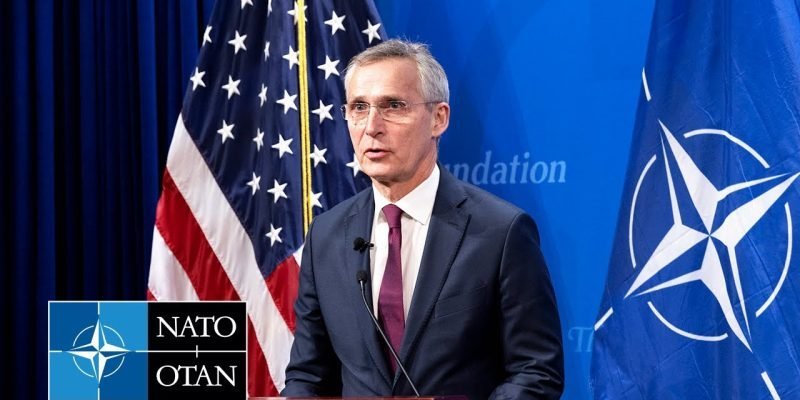
As NATO celebrates its 75th anniversary, internal discord and the Ukraine conflict dominate the agenda, raising questions about the alliance’s future.
The heads of state and government from all 32 NATO allies will converge in Washington from July 9-11 to celebrate the Alliance’s 75th anniversary. This summit, scheduled over a year ago, now arrives at a precarious time, with political and military tensions threatening to overshadow the event’s significance.
No one could have predicted the current concerns dominating American media and political discourse. President Joe Biden’s recent debate performance against Donald Trump on June 27 has cast a shadow over his leadership, potentially diverting attention from the summit’s critical discussions.
Publicly, the 31 non-U.S. NATO leaders will likely express confidence in Biden’s leadership and his vision for a second term. However, behind closed doors, whispers of doubt are expected to circulate among allied leaders, eager to share their concerns with the throng of journalists. Despite these reservations, there is a clear preference for Biden over Trump, who has previously shown a wavering commitment to NATO.
Holding the NATO summit now is also unfortunate due to the pressing matter of the Ukraine war. The agenda will be dominated by discussions on the level and type of support for Ukraine against Russia’s ongoing aggression. Led by the United States, NATO allies must carefully navigate the complexities of military aid, particularly the risks involved in targeting Russian territory. These sensitive discussions will likely occur in private rather than in the summit’s plenary sessions.
Not all NATO members are convinced of the need to risk their security for Ukraine. Countries like Hungary, whose Prime Minister Viktor Orbán recently met with Vladimir Putin, seem to defy the alliance’s unified stance. Concerns about potential Russian retaliation, including cyberattacks and the unlikely but feared use of nuclear weapons, further complicate the discourse.
Ukrainian President Volodymyr Zelensky’s calls for “victory” — reclaiming all territories occupied by Russia, including Crimea — present another dilemma. While it’s politically sensitive to oppose Ukraine’s aspirations, most experts agree that such an outcome is unrealistic. Yet, the allies at the Washington summit will struggle to openly challenge this narrative without appearing disloyal to Ukraine’s cause.
Discussions about potential negotiations with Russia will be conspicuously absent from the official agenda. Any consideration of peace talks, vital though they may be, will have to occur at a different venue and time. The allies face the unavoidable reality that any end to the war must be negotiated, with the terms acceptable to Ukraine and backed by major powers, namely the United States and Russia.
This strategic impasse reflects a historical blunder made at NATO’s 2008 Bucharest summit, where the promise of NATO membership for Ukraine (and Georgia) was declared. To Russia, this pledge was a significant provocation. Instead of rectifying this mistake, NATO continues to repeat it, likely to do so again at this summit, as a gesture of support for Ukraine.
Despite the geopolitical impracticality of Ukraine’s NATO membership, the commitment persists. It provides no immediate benefit to Ukraine and is unlikely to ever be realized, given the unanimous consent required from all NATO members for any new country’s admission.
NATO’s broader military capabilities and preparedness will also be reviewed. There have been notable advancements in military efforts, organization, and readiness, with most allies now meeting the target of spending at least two percent of their GDP on defense. This metric, more symbolic than substantive, was designed to appease the U.S. Congress’s demands for European allies to share more of the defense burden. Both Biden and Trump have claimed credit for these increases.
The summit will also skirt around the future of NATO-Russia relations. Despite current hostilities, geopolitical realities dictate that Russia remains an enduring presence in Europe’s security landscape. The aspiration for a “Europe whole and free,” as articulated by President George H.W. Bush and pursued by President Bill Clinton, remains unrealized. The 1997 NATO-Russia Founding Act aimed at cooperation, but relations soured in the early 2000s due to Putin’s territorial ambitions and U.S. policymakers’ misjudgments about Russia’s strategic significance.
As the Ukraine war continues, NATO must grapple with these long-term strategic concerns, even if they remain unresolved at this summit. The alliance’s ability to navigate these challenges will determine its future relevance and effectiveness in a rapidly changing global landscape.
In Washington, allied leaders will avoid discussing the deeper implications of Russia’s role in European security, postponing these critical conversations to an indefinite future. The NATO summit, meant to celebrate unity and strength, will instead spotlight the profound uncertainties and divisions within the alliance, making it a pivotal moment in its 75-year history.
-

 Minnesota2 months ago
Minnesota2 months agoFraud Allegations Close In on Somalia’s Top Diplomats
-

 Middle East2 months ago
Middle East2 months agoTurkey’s Syria Radar Plan Triggers Israeli Red Lines
-

 Editor's Pick2 months ago
Editor's Pick2 months agoWhy India Is Poised to Become the Next Major Power to Recognize Somaliland
-

 ASSESSMENTS2 months ago
ASSESSMENTS2 months agoSomalia’s Risky Pact with Pakistan Sparks Regional Alarm
-

 Analysis2 months ago
Analysis2 months agoTurkey’s Expanding Footprint in Somalia Draws Parliamentary Scrutiny
-

 Analysis2 months ago
Analysis2 months agoRED SEA SHOCKER: TURKEY’S PROXY STATE RISES—AND ISRAEL IS WATCHING
-

 Somaliland1 month ago
Somaliland1 month agoF-35s Over Hargeisa: The Night Somaliland’s Sovereignty Went Supersonic
-

 Somalia2 months ago
Somalia2 months agoIs Somalia’s Oil the Price of Loyalty to Turkey? MP Blows Whistle on Explosive Oil Deal

